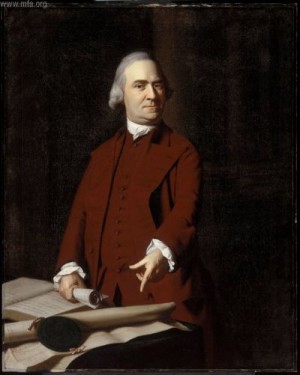[to Samuel Adams]
“Boston, Feb.10, 1775.
Dear Sir, – We were this morning alarmed with a report, that a party of soldiers was sent to Cambridge, with design- to disperse the [Massachusetts Provincial] congress. Many here believed it was in consequence of what was yesterday published by their order. I confess I paid so much regard to it as to be sorry I was not with my friends; and, although my affairs would not allow of it, I went down to the Ferry in a chaise with Dr. [Benjamin] Church, both determined to share with our brethren in any dangers that they might be engaged in: but we there heard, that the party had quietly passed the bridge, on their way to Roxbury; up[on] which we returned home. I have spent an hour this morning with Deacon Phillips, and am convinced that our existence as a free people absolutely depends in acting with spirit and vigor. The ministry are even yet doubtful whether we are in earnest when we declare our resolution to preserve our liberty; and the common people there are made to believe we are a nation of noisy cowards. The ministry are supported in their plan of enslaving us by assurances that we have not courage enough to fight for our freedom. Even they who wish us well dare not openly declare for us, lest we should meanly desert ourselves, and leave them alone to contend with Administration, who they know will be, politically speaking, omnipotent, if America should submit to them. Deacon Phillips, Dr. Church, and myself are all fully of opinion, that it would be a very proper step, should the congress order a schooner to be sent home with an accurate state of facts, as it is certain that letters to and from our friends in England are intercepted, and every method taken to prevent the people of Great Britain from gaining a knowledge of the true state of this country. I intended to have consulted you, had I been at Cambridge to-day, on the propriety of a motion for that purpose, but must defer it until to-morrow. One thing, however, I have upon my mind, which I think ought to be immediately attended to. The resolution of the congress, published yesterday, greatly affects one Wheston, who has hitherto been thought firm in our cause, but is now making carriages for the army. He assisted in getting the four field-pieces to Colonel Robinson’s, at Dorchester, where they are now. He says the discovery of this “will make him;” and he threatens to make the discovery. Perhaps resentment and the hope of gain may together prevail with him to act the traitor. Dr. Church and I are clear, that it ought not to be one minute in his power to point out the general the place in which they are kept; but that they ought to be removed without [delay]. Pray do not omit to obtain proper orders concerning them. I am, sir, in great haste,
Your very humble servant,
Jos. Warren
Please to present my affectionate regards to Colonel Hancock and other worthy friends[.]”
Source: “Samuel Adams Papers 1635-1826” In Wells and Bancroft Collection, New York: New York Public Library, manuscript letter. Text appears in Richard Frothingham, Life and Times of Joseph Warren. Boston: Little, Brown, & Co., 1865, p. 414.
Commentary: Joseph Warren keeps Samuel Adams apprised of events in Massachusetts. A rumor circulates that British troops would interfere with the Massachusetts Provincial Congress in early February, 1775. Joseph Warren and Benjamin Church prepare to join a confrontation, which does not materialize. A supposed Patriot Mr. Wheston is stigmatized as a traitor for making gun carriages for the British Army and threatening to expose the location of four cannon spirited outside of occupied Boston the previous Fall.
Joseph, if it is a traitor you are looking for, check out that Benjamin Church fellow with whom you are spending so much time in the Provincial Congress and its Committee of Safety.
The portrait by Samuel Adams is by John Singleton Copley, painted in 1772. Image courtesy of the Boston Museum of Fine Arts

 Follow
Follow